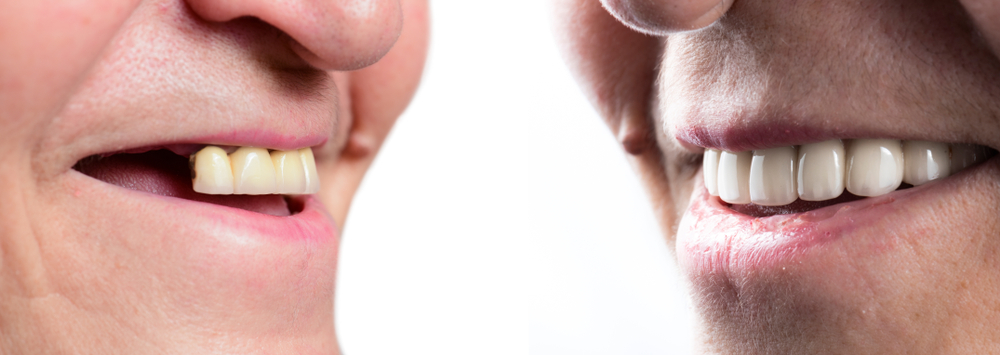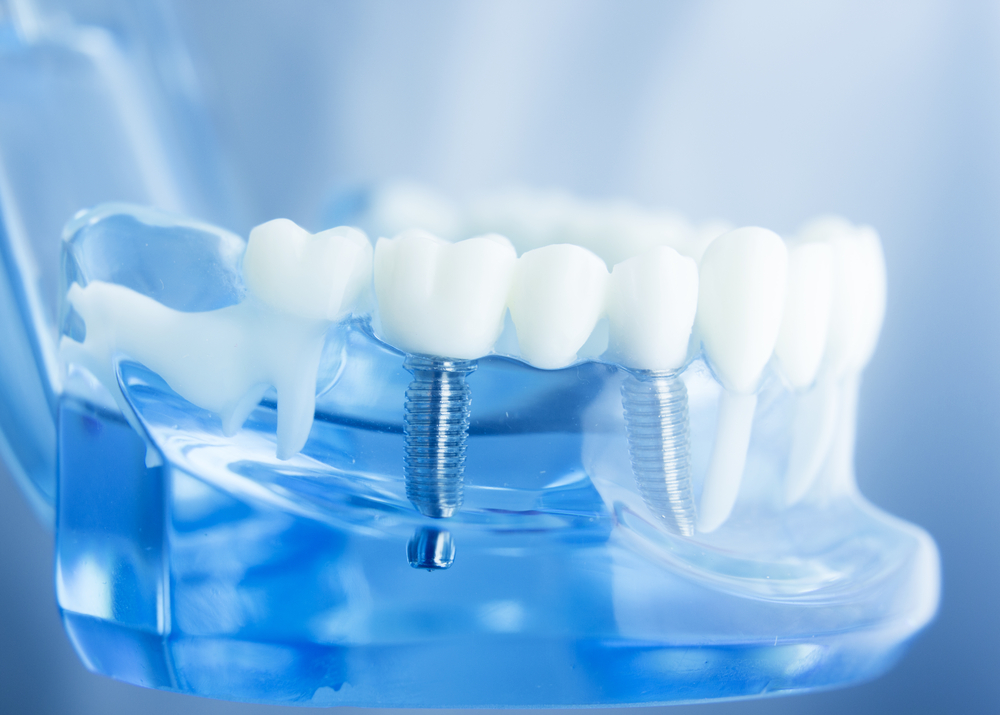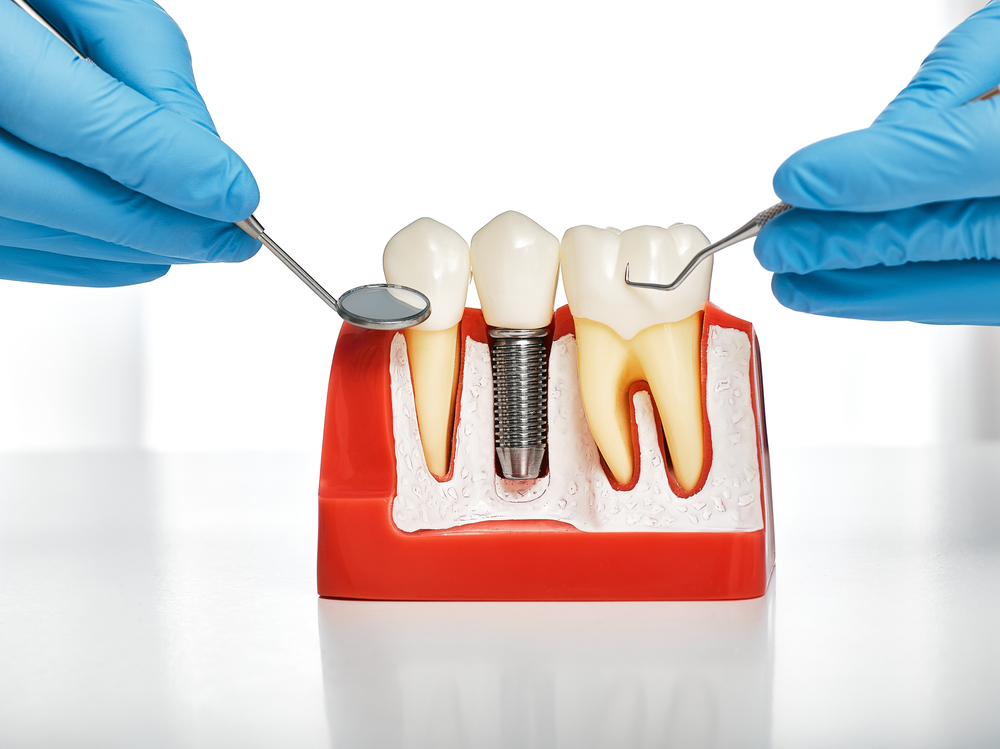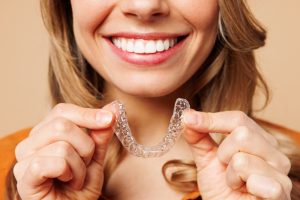Parkcrest Dental Group is a full-service dental practice based in Springfield, Missouri.
We can take of your entire family’s dental needs, including dental implants that can strengthen your bite and make it easier to chew your food.
Take a look at answers to frequently asked questions about dental implants in today’s guide.
What are dental implants?
Dental implants are designed to replace single teeth by creating a strong foundation with replacement tooth roots.
How do dental implants work?
A dental implant has three main parts:
- A post or cylinder made of titanium. Titanium bonds to your jawbone easier than other metals, and humans rarely have allergies to titanium. After your oral surgeon implants the post, it will need some time to graft (bond) with your current bone structure. This process may take several months before you receive your artificial tooth.
- An abutment that screws into the post. This is an extension of the titanium post and serves as a way for the artificial tooth to attach to
- The crown goes over the abutment. It’s the artificial tooth that has the look, appearance, and strength of a real tooth.
What are dental implants made of?
The posts are made of titanium, which is very strong and durable.
The artificial tooth and abutments are made of acrylic, a very strong and durable plastic.
Why would I need dental implants?
Dental implants replace individual missing teeth, and they work when you cannot or do not want crowns, bridges, or dentures.
Your dentist will talk to you about your options when it comes to dental implants.
Other reasons for needing dental implants include:
- Loose dentures, partials, or bridges. These can be a pain to keep fixing and adjusting. Maybe you don’t want to deal with partials and dentures anymore because of the extra maintenance needed.
- Extracted teeth, particularly when each extraction has two healthy teeth on either side of it when you don’t want a bridge.
- Difficulty chewing. Do you have difficulty chewing your food due to missing teeth? Having dental implants can help you enjoy your favorite foods with a full set of usable teeth.
- You want a full smile. You should always be confident with your smile, and missing teeth can affect your self-esteem.
What are the benefits of dental implants?
Patients may see several benefits from dental implants, such as:
- Support the artificial new teeth. As the bone grafts around the implant over several months, the implant strengthens. Implants are stronger because they form roots for your tooth.
- Alternative to bridges and crowns that are more permanent and don’t need daily maintenance other than brushing and flossing.
- Improve your self-esteem. If your smile is broken because of a cracked, loose, or missing permanent tooth.
- Support your overall oral health by helping you to chew. You can eat the foods you love easier.
- Mimics a natural tooth perfectly.
- Improved comfort by eliminating the discomfort associated with removing and inserting dentures.
- Better speech. Even poor-fitting dentures can cause speech problems and difficulties.
- Much better durability. Implants can last a lifetime if you take care of them properly.
- Convenience. Dental implants are more convenient than dentures and partials. You don’t have to take the implant out every night to clean it. Just simply chew your food, brush and floss twice a day, and take care of your oral health.
How long have dental implants been around?
The Ancient Chinese created dental implants 4,000 years out of bamboo. The pegs were carved to shape someone’s mouth and then inserted into the jaw to replace missing teeth.
Ancient Egyptians also used dental implants by making them out of precious metals, which may have been the first instances of gold teeth.
How do I care for my dental implants?
Single dental implants need the same basic care as your natural teeth.
- Brush as least twice a day with a soft-bristle toothbrush.
- Use a low-abrasive toothpaste to prevent wear.
- Brush on all sides of the dental implant crown, including the front, back, sides, and bottom. Make sure to brush around the gums, too!
- Consider a nylon-coated interdental brush to clean all areas of the artificial tooth’s surface.
- Make sure to floss with unwaxed floss or floss specifically designed for dental implants.
- Utilize an oral irrigator or water pick. It gently pushes a small stream of water in between teeth to dislodge food particles and help prevent bacteria build-up.
Will my artificial teeth ever need replacing?
No, if you take care of your implant like you would regular teeth. Because the implant is a solid representation of a real tooth and acts like a real tooth, it strengthens the artificial tooth.
Otherwise, the crown may need replacing every 15 to 20 years due to wear and tear.
What will my dental implant surgery be like?
First, your dentist will give you a comprehensive dental exam, including X-rays, before developing a treatment plan. Your doctor will help you develop a treatment plan.
The process starts by removing the damaged tooth. Then that portion of your jaw will need to heal for a bit before an oral surgeon implants a titanium post.
You will be completely asleep during minor dental implant surgery with an anesthetic so that you won’t feel anything.
You may need a bone graft to make sure your jaw can handle the new implant before you receive your artificial tooth.
When your oral surgeon starts to implant the rod, he or she will gently cut into your gums where the implant will go. Then a small drill makes a tiny hole in your jawbone.
The titanium post is inserted into the hole. After this surgery is over, it takes several months for osseointegration to take hold. This is when your jawbone grafts to the titanium implant to strengthen the implant rod.
Then a second minor surgery is needed to place the abutment, which goes into the rod and serves as the place where the artificial tooth will go.
Who can help me with dental implants in Springfield, Missouri?
Parkcrest Dental Group in Springfield, Missouri, can help you with dental implants and determine if you’re a candidate for this dental procedure. Contact Parkcrest Dental or call (417) 887-1220 for more information or to make an appointment with us.








